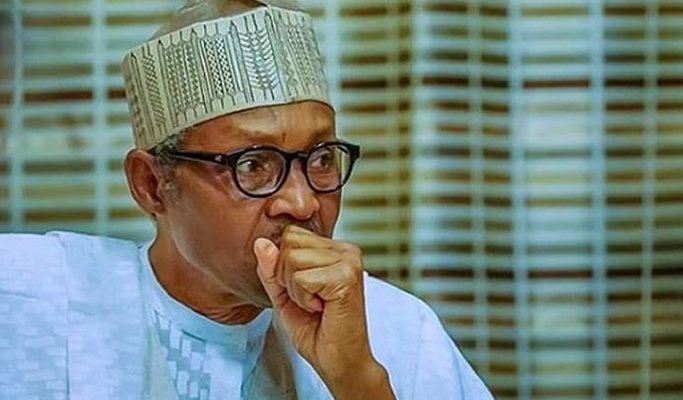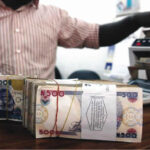
THE veil of pretence worn by the President, Major General Muhammadu Buhari (retd.), as an anti-corruption crusader has been lifted. The pardon granted to two ex-governors among 157 others in the exercise of the prerogative of mercy last week capped seven years of an unconvincing ‘war on corruption.’ With this, Buhari’s dreadful legacy is now complete: failure to tame insecurity and revitalise the economy conflates with the triumph of graft.
With his nonfeasance on all fronts, Nigeria is crumbling on Buhari’s watch. Untamed, corruption will help hasten the country’s meltdown. The people themselves will have to take action to push back against graft.
Though the regime’s commitment to fighting graft had long floundered, the pardon granted to Joshua Dariye and to Jolly Nyame, ex-governors of Plateau and Taraba states respectively 1999-2007, after some years into their separate jail terms for graft, still shocked many. It was devastating; precisely because after two decades of an on-off anti-corruption drive, they were the only two highly politically exposed persons that the weakened criminal justice system had been able to put behind bars.
The process was typically Machiavellian, following the trajectory of the law but battering its spirit. The two ex-governors were lumped with 157 others for pardon. The clemency was recommended as stipulated in the constitution by the advisory Council of State, after receiving the recommendations from the 12-member Presidential Committee on the Prerogative of Mercy chaired by the Attorney-General of the Federation. Expectedly, regime spokesmen will cite due process to justify the perfidious act.
But Nigerians and the outside world know that elite solidarity is at play: the Nigerian state has given up on the anti-corruption war regardless of rhetoric to the contrary. It is tragic.
Convicted for N1.16 billion and N1.6 billion fraud respectively, Dariye and Nyame were jailed 10 and 12 years respectively and their sentences separately confirmed by the Supreme Court. With the reprieve, the essential ingredient of deterrence is weakened.
Though the pardon was said to be on “compassionate grounds and on ill-health,” there are many among the 70,056 inmates in the custody of the Nigerian Correctional Services as of October 2021 equally deserving of such compassion. Some 50,822 inmates, representing 72.5 per cent of the total, are awaiting trial cases, some for many years.
The action sounds the death knell on Buhari’s discredited anti-corruption posture. For Nigeria, it is disastrous. Corruption is destroying the country. All forms – petty, grand, systemic and state capture – thrive. The Dariye-Nyame pardon fits into the “legal corruption” definition provided by the World Bank where “power is abused within the confines of the law” and the powerful use the law to protect their own.
Corruption, writes the Carnegie Endowment for International Peace, “is the single greatest obstacle preventing Nigeria from achieving its enormous potential. It drains billions of dollars from the country’s economy, stymies development, and weakens the social contract between the government and its people.” NEITI estimates that between $15 billion and $18 billion leaves as illicit financial outflows yearly.
Elected and appointed public officials have stolen the country blind, ruined the economy, rendered 55 per cent of the youth jobless and made Nigeria the poverty capital of the world. While Egypt raised electricity power generation from 24,000 megawatts to 59,000MW to become Africa’s largest producer within a decade, Nigeria has spent over $10 billion in two decades to raise generating capacity from 3,000MW to only 12,000MW but can transmit just over 4,000MW. Most of the funds cannot be accounted for.
Of the 36 state governors 1999-2007, 33 were accused of defrauding their states. Several are still undergoing trial. The judicial system has been unable to convict most Politically Exposed Persons; some pronounced guilty by lower courts were set free by appellate courts. Hopes raised by the convictions of Dariye and Nyame that justice will nab the elite have been dashed. Impunity reigns and, according to the Socio-Economic Rights Project, “will continue as long as influential politicians escape justice for their crimes.”
First elected in 2015 on the twin promises to crush insecurity and corruption, Buhari began to sabotage the assault on graft from his first day in office by his nepotistic and sectional appointments and policies. Surrounding himself overwhelmingly with appointees from his ethnic, family, regional and sectarian cocoon, he lost the crucial buy-in from all other sections of the diverse polity needed to successfully fight the two wars. In a pluralistic country, sectionalism is the ultimate corruption; it guarantees failure in overcoming national threats.
The self-subversion has persisted. Persons accused of, or facing corruption trials/investigations, gained public office. Some have their cases dropped once they join the ruling party. A former chairman of the ruling party once publicly invited opponents to join them promising that their “sins would be forgiven.” Several individuals recently elected to lead the party, including the chairman, have long-running graft cases against them. A former governor of Gombe State had his N5 billion fraud trial discontinued after he stepped down from the contest for the Senate presidency in favour of the regime’s choice.
Buhari’s missteps include the confirmation debacle of Ibrahim Magu as chairman of the Economic and Financial Crimes Commission. Undermined by the State Security Service, he was never confirmed and was eventually booted out. Buhari failed to coordinate or appoint a coordinator for the war on graft and looked on while agencies and the AGF squabbled publicly over asset disposal and prosecution. There has never been proper accountability over seized assets. Some of his ministers have pending cases with the anti-graft agencies. Recruitment scandals have been reported at the Central Bank of Nigeria, the Nigerian National Petroleum Company and the Federal Inland Revenue Service with no strong action taken.
Nigeria’s is a classic case of “isomorphic mimicry,” where local institutions mimic similar institutions performing effectively in other jurisdictions, but fail to deliver their targeted outcomes. Thus, Nigeria has a slew of laws to combat graft and money-laundering; institutions such as the EFCC, the Independent Corrupt Practices and Other Related Crimes Commission, the Code of Conduct Bureau, the Police Special Fraud Unit, and Financial Reporting Council, and the courts. They have failed to crush corruption.
In contrast, Singapore, with only the Corrupt Practices Investigation Bureau created under the Prevention of Corruption Act, is ranked fourth least corrupt nation in the world after Denmark, Finland and New Zealand. China’s National Supervision Commission has since 2018 successfully overseen the government’s anti-corruption drive where over 50,000 officials have been punished.
But Nigeria dropped five places to 154th out of 180 countries in the Corruption Perception Index 2021. A notable cleric, Mathew Kukah, thundered: “Our politics is broken. Our economy is broken. Our energy system is broken. Our security system is broken. Our roads and rail are broken. Only corruption is alive and well.”
One likely effect of the pardon is to weaken morale in the anti-graft agencies and among their dedicated officers, as well as the upright ones among the judges. Despite supervisory compromise, the EFCC secured 2,220 convictions in 2021, 127.5 per cent higher than the 1,280 secured in 2019. It also recovered N152.86 billion and $386.22 million. On its part, the ICPC said it recovered N166.5 billion from corrupt persons and entities in the 18 months to December 2021.
They struggle against very difficult odds, hamstrung by an insincere, duplicitous regime, an ambivalent and sometimes allegedly obstructionist Office of the AGF and a National Assembly that visibly lacks commitment to the anti-graft campaign. They need encouragement.
What next? Betrayed by the political leadership, the legislature and often also by the judiciary, Nigerians need to step up peaceful agitation against graft using all legal means. Peaceful protests, recourse to the Freedom of Information Act, sit-ins at parliamentary premises and interrogation of elected officials at local, state and federal levels are legitimate weapons of ‘People Power.’
Between 2017 and 2019, thousands of Romanians marched across major cities and towns to protest the government’s laws pardoning corruption convicts and weakening penalties against abuse of power. The obnoxious laws were withdrawn and the protest movement spawned a renewed anti-corruption drive in the East European country. Similar popular protests since 2015 have been tracked by Carnegie in Guatemala, Iceland, Brazil, Lebanon, Malaysia, and South Africa. South Korea’s youths, through peaceful protests in 2017, forced the ouster, trial and conviction of President Park Geun-hye and others for corruption.
Nigeria’s labour movement, students, professional bodies and civil society groups and the mass media that heroically fought oppression under colonial and military rule should take up the fight, speak truth to power and hold officials accountable. Democracy is a participatory governance model; leaving it exclusively to politicians since 1999 has facilitated impunity, poverty, joblessness and unbridled corruption. The people should demand accountability and good governance.
The anti-graft agencies and upright judges should not despair, give up or compromise in the light of the treachery of the political class; they should continue to soldier on bravely, and answer to their consciences, their oath of office and the higher public good.
Section 15, sub-section 5 of the 1999 Constitution compels the Nigerian government to act; “The State shall abolish all corrupt practices and abuse of power.” It is the responsibility of all Nigerians to insist that Buhari and every other public official fulfil that constitutional mandate.
Copyright PUNCH.
All rights reserved. This material, and other digital content on this website, may not be reproduced, published, broadcast, rewritten or redistributed in whole or in part without prior express written permission from PUNCH.
Contact: [email protected]





